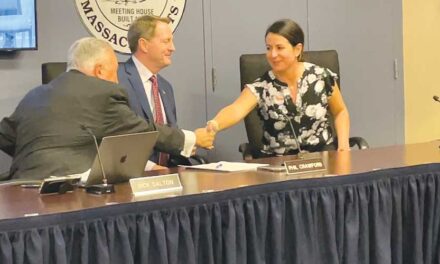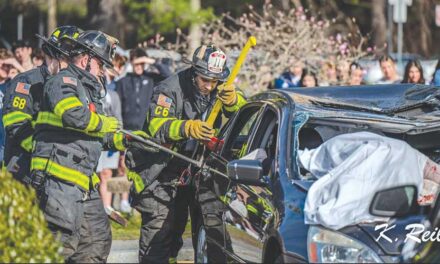Published in the March 30, 2016 edition
By MAUREEN DOHERTY
LYNNFIELD — The Board of Selectmen voted unanimously to recommend that Town Meeting voters accept the proposed changes to the town’s combination career and call firefighter staffing plan.
The proposal, first pitched last year by Fire Chief Mark Tetreault and refined over the past year when the selectmen wanted more time to analyze the effect of this change, will increase coverage at the town’s two stations from the current 8.5 hours per day, five days per week to 12 hours per day seven days per week.
Tetreault proposed the overhaul as a means to preserve the town’s hybrid system while adapting the scheduling to reflect the realities of today’s two-parent working families.
He also considers it necessary to address the steady year-over-year increases in the number of calls for service made to the department and the ever-increasing training requirements by the state for all career firefighters, call firefighters, EMTs and paramedics.
The Fire Department’s salary budget proposed for FY ’17 is $1,428,323, which is an 18.7 percent increase over last year’s budget of $1,203,150, or an increase of $225,173. Town Administrator Jim Boudreau recommended to the selectmen that they support the proposal by the fire chief.
Crawford on board
Selectmen Chairman Phil Crawford, who was originally skeptical about whether the proposal would work for the town, announced his support for the change at the board’s March 21 meeting. He said he had analyzed it for the past six months, speaking with fire chiefs, town administrators and other officials familiar with such staffing issues in about 25 other towns, in addition to his discussions with the local department.
“I had issues with the new staffing plan and how we move forward with that. It’s a sizable amount of money we are putting into the Fire Department,” Crawford said.
Crawford added that the town’s 2009 study of the department’s operation “spoke to the fact that if our on-call system was breaking down we should also look at the possibility of using private ambulances. So I spoke to the ambulance companies. I looked at other towns that had private ambulances as opposed to our system, and what’s glaringly obvious to me is the town of Lynnfield has saved millions of dollars with our on-call system.”
Acknowledging that Lynnfield is one of the few towns left in the state with this type of on-call system, he said the town also has a higher participation rate than other towns that still use call firefighters.
“It’s a culture and the last thing I’d like to do is to break that up, especially prematurely,” Crawford said, adding that he was told by the Chief Tetreault that more young recruits are coming forward and others are due to join in the summer, giving the department a “renewed energy.”
Crawford said his inquiries convinced him that if the town were to opt for a private ambulance company “it would decimate the current system” with no savings to the town. “You still have the expense of having a truck sent out to the ambulance and having our ongoing expenses of manning the stations, so there really is not any benefit to the town,” he said.
The big question remains the final collective bargaining agreement that is currently being worked out between the town administrator and the town’s firefighters’ union, Lynnfield Firefighters Local 2472, Crawford said. By all accounts those talks are going well and certainly better than they had three years ago when the agreement “fell apart,” he said, forcing both parties back to the bargaining table. “I don’t have any doubt that the unions will work in a mutually beneficial way to get this worked out,” Crawford said, noting that the new funding and staffing plan would not be put in place until the new contract is signed.
“As far as the staffing goes, I believe there is an overburden on both our career and our on-call guys. We went from 400 calls 20 years ago to almost 2,000 this year so there is an awful lot of burden put on these firefighters. I do believe that the new staffing plan is a great step in remedying that situation,” Crawford said.
Andrew Lyons, president of the Lynnfield Firefighters Local 2472, thanked the selectmen for their support and doing their “due diligence” in researching and deliberating on the first major overhaul of the Fire Department’s staffing operations since 1971.
“We put a lot of time into it, as did you. The collective bargaining aspect of it has already been a good working relationship with the new town administrator. And to be totally honest, having a goal in sight makes collective bargaining even easier,” Lyons said.
Lyons added, “I don’t foresee any hangups on either side with this and I really appreciate you taking the time and voting the way you did. The Lynnfield firefighters look forward to even better serve the community moving forward, building on the history that we have with the combination system.”
Fire Department expenses for FY ’17 are proposed to total $1,428,323, which is $225,173 more than FY ’16. This $1.4M figure includes no change in the fire chief’s salary ($114,444), a 16.2 percent increase in the salaries of full-time firefighters ($744,373), a 38.1 percent change in call firefighter salaries ($441,078) and level funding for fire department expenses ($107,033), fire alarm salaries ($13,267) and fire alarm expenses ($8,128).
The increase in the call department salaries is attributable to the guaranteed hours the new staffing plan requires for the 12-hour shifts and the increase in the full-time firefighters’ salaries is due to the need to hire additional career firefighters, also to implement the new plan. All agreed these expenses would increase if the call firefighter system was abandoned in favor of an all-career department.
Support operating budget of $50.7M
In addition to supporting the town administrator’s recommendation to fund the proposed fire department budget, Crawford and fellow Selectmen Tom Terranova and Chris Barrett supported Boudreau’s total budget recommendations for the town’s operating budget of $50,405,204.
An unknown factor remains state aid, which Boudreau is projecting may modestly increase over the current fiscal year by eight-tenths of one percent to $377,255. If his projection is correct, the total general fund budget available to the town in FY ’17 would be $50,782,459.
The figure funds the School Department’s operating budget request of $22,865,421, which is an increase of 4.5 percent over the current fiscal year, in addition to the general government proposed budget. Boudreau said he recommends supporting the School Department’s budget, which funds tuition-free full day kindergarten.
Other expenses in the total education budget covered by the FY’17 proposed operating budget is $2,518,560 for school health insurance, which is an eight percent increase ($186,560) over the current fiscal year, and an assessment of $357,615 for North Shore Technical High School, which reflects a two percent decrease ($7,322) over FY ’16. These two line items bring the town’s total education expenses to $25,741,596.
Boudreau said the “only other big change” in the line item budget outside of the Fire Department and School Department is the “larger than normal increase in the salary of the recreation director. Based on the board’s conversation with recreation that evening I have recommended their request for the salary increase is in the budget.” To bring the salary of Recreation Director Julie Mallett more in line with the salary this position offers in similar sized towns, a salary increase of $9,420 (21 percent) has been factored into the budget, which would increase it from $44,880 in the current fiscal year to $54,300.
“She would still remain underpaid compared to other communities,” Barrett said. Crawford added, “Not to mention the additional work she has taken on every year.” Other salaries in the Recreation Department are self-funded through the fees collected for events and programs.
“Last year we had to increase the amount of the expenditure under the (Recreation) revolving fund,” Boudreau said. “We’ll have to do that again this year. That is entirely reflective of the amount of programs that they’re offering.”
Capital budget
Capital budget requests submitted by the town’s department heads to the town administrator totaled $3,319,087 for FY ’17. Of these requests, Boudreau recommended to the selectmen that $2,388,908 in capital expenditures be approved, which is $908,179 less than the wish list submitted.
The selectmen agreed with Boudreau’s recommended capital expenditures totaling $2,388,908 and with his recommendation to bond $849,000 to replace a 30-year-old fire engine ($489,000) and three aging DPW trucks ($360,000).
That leaves a balance of $1,539,908 in capital expenditures to fund. The selectmen also agreed with Boudreau’s recommendation to fund these expenses with $1,100,000 from the town’s Free Cash account, which would leave a balance of $439,908 in capital expenses to be funded from tax appropriations. If these capital expenditures are passed by the voters at Town Meeting on April 25 as proposed, the balance remaining in the town’s Free Cash account, would be $1,884,998.




